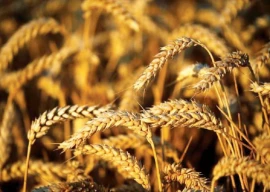
Thousands of gallons of untreated industrial waste continues to be dumped into a canal which brings water to Karachi, despite claims that a new treatment plant has started working.
Some 150 kilometres from the city, factories in Kotri are using the Kalri Baglihar (KB) feeder to get rid of acidic waste which some claim is responsible for the deaths of hundreds of fish earlier this month.
“Nobody is ready to take responsibility. Some officials flatly refuse to even accept that industrial waste is being mixed with clean water,” said an irate Misbahuddin Farid, the Karachi Water and Sewerage Board’s (KWSB) managing director.

Farid and his team recently inspected the point from where the hazardous waste is released into the canal. “This is not our jurisdiction, so we can’t do anything. The irrigation department should be looking into this. But with our own eyes, we have seen what is happening to this water channel.”
Factories in Kotri Association of Trade and Industry (KATI) dump their waste on an open ground from where the acidic water seeps into the canal which feeds Keenjhar Lake. Over 100 companies - including multinational firms - have factories in KATI. The industrial estate was developed in 1970s and since then, no steps had been taken to prevent water from getting contaminated.
When asked why waste continues to be dumped into KB feeder despite the new treatment plant, the industries and environment departments as well as Sindh Industrial Trading Estates (SITE) Limited were not willing to comment.
Every now and then, environmentalists raise hue and cry about high levels of toxicity in Keenjhar Lake whenever dead fish emerge from the canals. The latest incident happened a few days ago. The government has, however, no system in place to regularly test the water. Young men who operate the barrage on KB feeder at Chul rely on the naked eye to decide if water is good enough to be released into the lake. “We pulled down the gates when hundreds of dead fish floated here last week,” said a worker at the barrage. “That redirects the water towards irrigation network.”

The visit of the KWSB team followed reports about high levels of contamination. Farid had to argue for over an hour with industrial and environment officials to convince them that waste was being released into the city’s main water channel.
“They are not ready to accept that this is happening,” he said. “Maybe they will move into action when people start dying. More than residents of Karachi, the people of Kotri are at risk.” Nearly two dozen water hydrants run round-the-clock at the bank of KB feeder, right besides the 36-inch pipe from where industrial waste is released. Water is sucked out of the canal and filled into tankers that supply water to the residents of the nearby Bihar Colony and Bhittai Colony.
World Wide Fund for Nature’s (WWF) Ghulam Rasool Katri said that skin problems have become common among people who rely on water directly from the canal. “As for Karachi, the toxic waste gets diluted in the large quantity of water at Keenjhar Lake. But that doesn’t mean everything is okay. Continuous contamination is dangerous in any case.”
The result of water samples that KWSB took from the site have yet to come. But water officials and environmentalists say some chemicals must be behind the mysterious death of hundreds of fish every month.
A senior SITE official said the problem will be solved once the plant starts working at its full capacity. Businessmen who have worked with SITE have raised questions about its performance. “SITE Limited easily earns Rs250 million every year. No one knows where that money is spent,” said a former office bearer of SITE Association of Trade and Industry.
Published in The Express Tribune, January 30th, 2013.




















1714024018-0/ModiLara-(1)1714024018-0-270x192.webp)















COMMENTS
Comments are moderated and generally will be posted if they are on-topic and not abusive.
For more information, please see our Comments FAQ